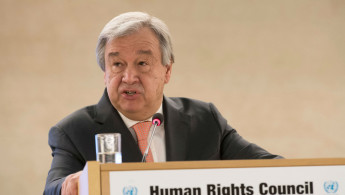UN calls urgent Syria meeting after Trump threat
As tensions mounted over a face-off with Damascus-ally Russia, opponents of unilateral US action called an emergency closed-door meeting of the UN Security Council for Thursday.
Britain also scheduled an emergency cabinet meeting.
With punitive US military action seemingly imminent, Russia scrambled to deflect blame from Syria's Bashar al-Assad and, according to a monitor group, regime forces evacuated key defecse buildings in Damascus.
Trump's bellicose tweets came in response to a warning from Russia's ambassador to Beirut, who took to a television network run by the armed group Hizballah to declare that any US missiles would be shot down "as well as the sources they were fired from."
If the US action follows the pattern of a previous punitive strike on Syria last year, it will begin with a salvo of cruise missiles fired from US warships in the Mediterranean, as Trump implied when he tweeted they would be "nice, new and 'smart.'"
Defence Secretary Jim Mattis as well as CIA director Mike Pompeo met at the White House on Wednesday to discuss options, White House spokeswoman Sarah Sanders said.
With the UN Security Council failing thus far to find a diplomatic solution, Secretary General Antonio Guterres warned Wednesday that time was running out.
"Today, I called the ambassadors of the five permanent members of the Security Council to reiterate my deep concern about the risks of the current impasse and stressed the need to avoid the situation spiraling out of control," he said, referring to the United States, Russia, China, France and Britain.
 |
Moscow and Washington have so far vetoed each other's motions to set up an international investigation into chemical weapons use |  |
Chemical veto
Moscow and Washington have so far vetoed each other's motions to set up an international investigation into chemical weapons use.
The Russian army has continued to deny Assad launched a chemical attack on Douma, which until Thursday was the last rebel-held pocket of the Damascus suburb of Eastern Ghouta, instead accusing the White Helmets civil defence organization of staging the supposed gas assault.
Trump's spokeswoman dismissed this idea, and pointedly refused to say that concern about the risks of a direct confrontation with Russia would hold the US military back.
"The intelligence provided certainly paints a different picture," Sanders said. "The president holds Syria and Russia responsible for this chemical weapons attack."
President Donald Trump gathered senior military leaders at the White House on April 9 to weigh the US response to a suspected chemical attack in Syria
But while the Russian president's lieutenants continued to up the ante with threats and allegations, Vladimir Putin himself adopted a more statesmanlike tone, in remarks to new ambassadors presenting their credentials at the Kremlin.
"The situation in the world is becoming more and more chaotic but all the same we hope that common sense will finally prevail and international relations will take a constructive path," he said.
Trump's tweets were more belligerent. He told Russia: "You shouldn't be partners with a Gas Killing Animal who kills his people and enjoys it!" He declared that US relations with Russia have plunged to a historic low.
But Trump notably also said there was "no reason for this," reiterated his hope for talks with Putin to halt a new arms race, and blamed his domestic political opponents for poisoning ties.
Assad's Damascus regime, which has long accused Washington of supporting its armed opponents in the country's bloody seven-year-old civil war, hit back at Trump's "reckless escalation."
Damascus agreed to hand over its chemical arsenal in 2013, narrowly avoiding American and French air strikes in retaliation for a suspected sarin attack.
That incident, which killed hundreds, also took place in Eastern Ghouta.





 Follow the Middle East's top stories in English at The New Arab on Google News
Follow the Middle East's top stories in English at The New Arab on Google News


